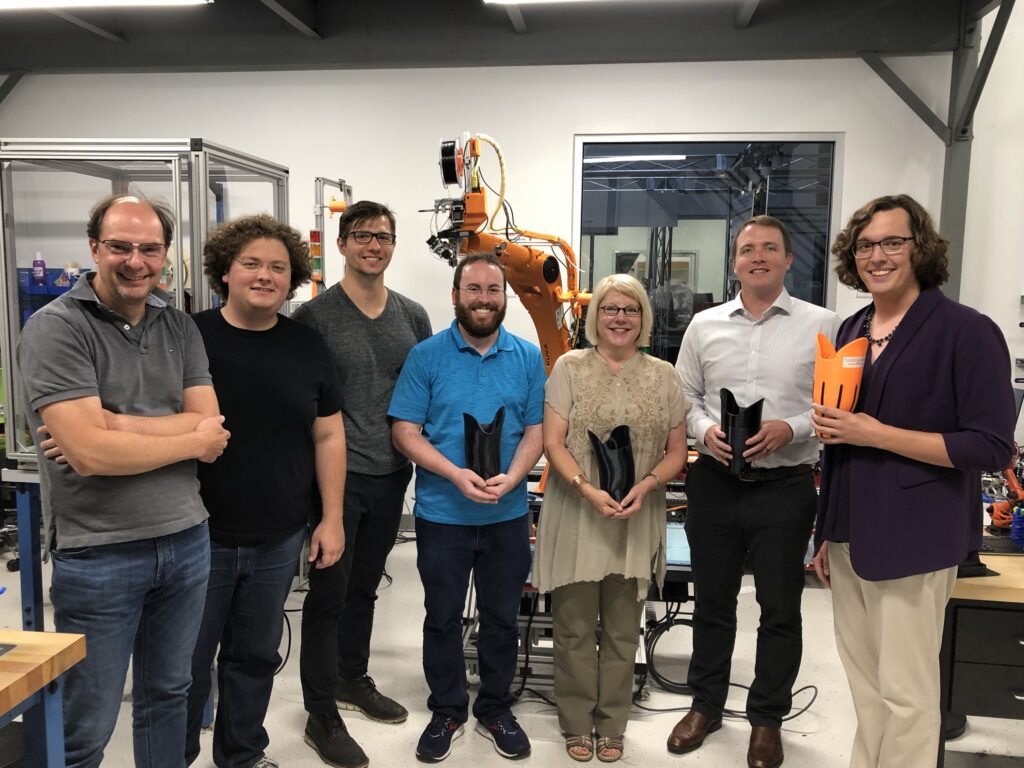
The Moore School and Professional MBA students collaborated with two SmartState Centers and two South Carolina companies to apply new technologies in aerospace manufacturing to prosthetic limbs.
Beginning in 2014, TIGHITCO, a manufacturer of aerospace parts with a location in North Charleston, South Carolina, joined forces with Michel van Tooren, the SmartState Endowed Chair for Multifunctional Materials and Structures, to improve additive manufacturing for aerospace applications. Soon after, TIGHITCO’s Arturs Bergs relocated to Columbia to work with van Tooren and his research team at the UofSC McNair Center on the project.
Bergs, now the director of research and development for TIGHITCO, is still working with van Tooren and the McNair Center, but in 2019 they added to their project Professional MBA program students and Laura B. Cardinal, the SmartState Endowed Chair for Innovation + Commercialization within the Moore School. The team works on aerospace manufacturing for TIGHITCO but also utilized their 3D additive printing to create prosthetic limbs for Extremiti3D, a prosthesis manufacturer. Initially the project was funded by a Small Business Innovation Research grant.
“I originally came to van Tooren’s SmartState Center to develop a process for integrating continuous carbon fibers with polymers using 3D additive printing in order to reduce failures of parts in the aerospace industry,” Bergs said. “Because of the expertise of van Tooren and his students, we were able to rapidly advance ideas with potential commercial applications. The relationship with the Moore School’s Professional MBA program students was an added bonus.”
Bergs and Wout De Backer, a postdoctoral fellow and program manager for robotic printing within van Tooren’s lab, developed a new approach to manufacture prosthetic sockets. Combining the lab’s robotics-assisted 3D printing process and a new nylon-based variation of the material initially created for aerospace applications, the new prosthetic limbs are lighter in weight with the potential to have more load-bearing capacity and can easily be personalized to an individual’s physical characteristics.
“We’re very excited about the potential of both the 3D printing and prosthetics technologies,” Bergs said. “But to move the technology forward, we have to understand market potential.”
To assist in realizing the product’s commercialization potential, van Tooren involved Cardinal and the Professional MBA program students.
“Cardinal’s expertise in managing innovation and commercialization, a knowledge base honed conducting research with global companies such as Sara Lee, Reichhold and Rockwell, would serve as another invaluable resource,” van Tooren said. “Cardinal’s Professional MBA program students, who work full-time for companies across the Carolinas, would bring additional talents to the project.”
Cardinal, who uses her SmartState Center to provide hands-on learning opportunities for Professional MBA program students, recruited her students from her Strategic Management of Technology and Innovation course. Elizabeth Haughton, a process engineer with Savannah River Nuclear Solutions in Aiken, South Carolina, and Will Coughlan, a sales manager for Metglas, Inc., in Conway, South Carolina, conducted market research through an independent study project for course credit.
Haughton said the project enabled her to develop an entirely new skill set as a market analyst.
“It was intense,” Haughton said. “While most of our work was spent analyzing existing market research, industry reports and websites, we also interviewed people in the medical device industry. It really pushed us to not only learn new concepts and industries, but also how to apply UofSC and TIGHITCO’s technology to the prosthetics market for Extremiti3D.”
Coughlan said he was easily able to transfer his skillset in product management for Metglas to the SmartState prosthetics project, despite the two companies possessing differing technologies and being in different industries.
“What was exciting was being given a blank slate and running the project on our own,” Coughlan said. “It was a little stressful when two weeks before our deadline, other deliverables changed. [Haughton] and I did a quick pivot and kept going,” Coughlan said.
Like other Professional MBA students, Coughlan was not only balancing a full-time job and his Professional MBA program course load, but he was also balancing a family and awaiting the birth of his and his wife’s third child during the project.
For Haughton and Coughlan, their project concluded with a formal presentation and recommendations to van Tooren, Bergs, De Backer and Cardinal. The stakeholders in the audience were impressed by Haughton and Coughlan’s market validation, and Extremiti3D later reported that the students validated many of the findings from their own internal market research.
“We were looking for affirmation for our technology and that we were moving in the right direction,” Bergs said. “[Coughlan] and [Haughton] not only provided new information, but they also provided industry contacts who may potentially lead us to the next stage in commercializing our technology.”
In continuing to leverage SmartState Centers, their endowed chairs and students in the Moore School and McNair Center, van Tooren sees great potential for future technologies.
“The purpose of applied science is to discover solutions to the issues facing society,” van Tooren said. “The best way to do this is to bring industry into university research labs and classrooms, much like TIGHITCO has done in placing Bergs in my lab. This allows our scientists and students to focus on the industry-driven research and development companies can either no longer afford or prefer not to divert people and dollars away from commercial activities. SmartState Endowed Chairs, our people and labs fill this gap.”